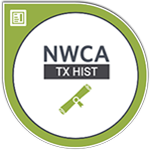PURPOSE
The Texas History Specialist credential documents the essential competencies for general knowledge related to the history of the state of Texas in terms of major events and people, and economic, domestic, and political life.
AUDIENCE
This credential is appropriate for professional who requires knowledge of Texas history to support a career position including historians, history interns, anthropologists, archaeologists, archivists, museum curators and workers, periodical editors and journalists, geographers, teachers and community educators, political scientists, sociologists, historical society staff, and those who write for a variety of purposes.
JOB / CAREER REQUIREMENTS
Credentials in the various areas of Texas History denote competencies including overall knowledge of the Texas history including major events, people, and factors in its historical development. Though many of these positions require appropriate education at various levels and numerous types of training, a fundamental understanding of Texas history supports many aspects of the daily task and strategic decision-making.
TEXAS HISTORY WORKPLACE TASKS:
- Historians gather and analyze historical related data, engage public in educational programs, archive and preserve materials and artifacts, provide guidance on historical topics and preservation issues, and write reports, articles, and media pieces on historical topics.
- Anthropologists and archaeologists study the environment and populations, collect and analyze historical data, conduct research, write reports, make educational and information presentations, and provide guidance for policies, programs, and other endeavors.
- Archivists authenticate and appraise historical documents and materials, preserve and maintain documents and objects, maintain computer archives and databases, create policies for the public, provide assistance and guidance on public and private records.
- Museum curators, museum technicians, and museum staff manage collections, design exhibits and programs, manage museums, provide guidance on museum collections and topics, work with civic organizations for publicity and preservation of historical items, and conduct research related to historical topics
- Editors, writers, and journalists read and write content for publication, evaluate submissions, create story ideas and content, research facts for stories, manage photo and illustrations for story support.
- Teachers and community educators research historical topics, develop curriculum, present educational lessons using a variety of formats and at many different levels of education, and evaluate learning.
- Sociologists research theories related to historical and social issues, collect and analyze data, report findings, and advise different types of groups on policy and sociological issues.
EXAM STRUCTURE OVERVIEW
Number of Questions in Exam: 135
Total Time: 110 minutes
Overall Passing Score: 70%
(All sections require an individual passing score of 70%)

